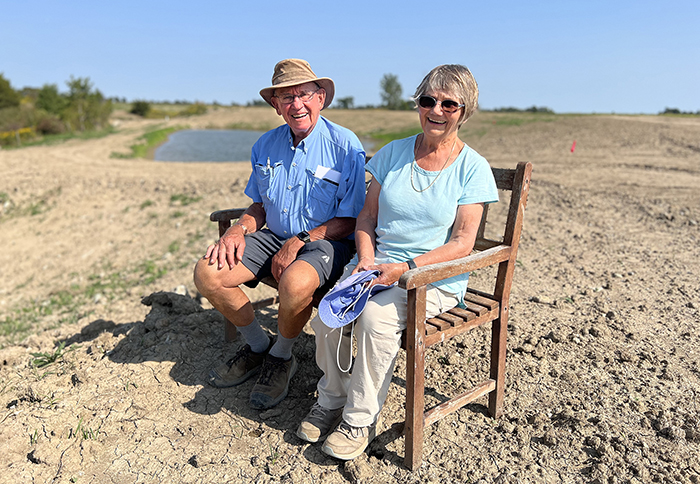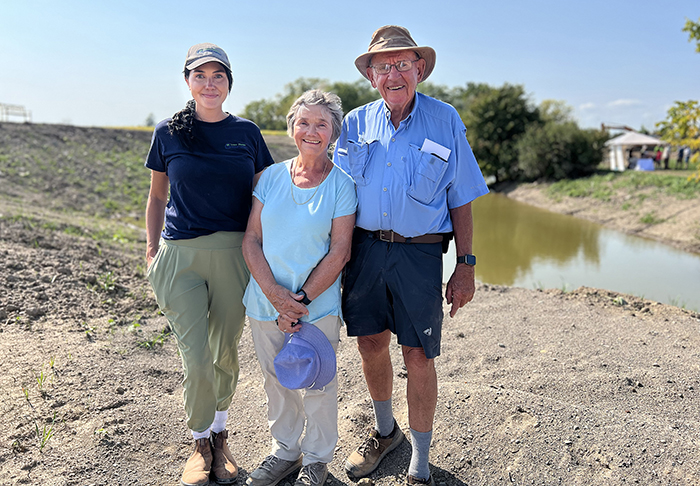
By Pam Wright
Local Journalism Initiative Reporter
Might “Turtle Beach” become one of C-K’s hottest reptile destinations?
Bob and Moira Kerr hope so.
The man-made bit of sand is but one of the features of the new Kerr-Wilson Renaturalization Corridor being constructed by the couple along a portion of the Flooker-Hinton municipal drain west of Charing Cross.
It’s a full-on labour of love for the ecologically minded Kerrs.
“I would hope to lead by example,” said Bob of the project that’s been two years in the making.
When complete, it will reclaim a 12-acre slice of land for nature.
“We have an opportunity here to give back land that is not ideal for farming. So, we’re going to give it back to nature,” he said.
Plus, he joked, wife Moira “hates to see bare ground.”
With construction underway for the past month, the development was one of six local revitalization projects featured in the Lower Thames Valley Conservation Authority’s fourth annual Cultivating Conservation tour Sept. 11. The self-guided tour showcased different properties where landowners worked with the authority to complete projects to enhance the environment.
Besides the Kerr-Wilson initiative, stops included the Gutoskie tallgrass prairie project; the Buis project where livestock exclusion fencing has been installed; a tree planting project on the Dodman property; the installation of green infrastructure and drainage on a McKinlay property and a wetland installation on the Brinkman property.
ALUS (Alternative Land Use Services) also collaborated on the projects.
The Kerr-Wilson corridor is located on land that was once used to graze cattle and raise cash crops. The parcel of land west of the drain was owned by the Kerr family, while the east parcel was owned by Bob’s late grandfather Robert Wilson, a former reeve of Harwich Township.
Still in its early stages, the corridor is a testament to nature. Three new wetlands, a hibernaculum for snake habitat, an irrigation pond, an inline pond and a sediment pond have been installed. Native pollinator plants, headland buffer areas, and the planting of native Carolinian trees along the slope are part of the future plan.
A bench has been installed adjacent to Turtle Beach and the couple plans to build a bridge across the drain next year.
According to Bob, the development is a team effort. The Kerrs worked with a consultant, Darrel Dick Excavating, the LTVCA, the Municipality of Chatham-Kent and the federal government.
Permission to alter the watercourse was needed from both the municipality and the Department of Fisheries and Oceans to allow for the construction of three “Newbury” weirs. The weirs are designed to hold back water, but still allow fish passage.
The intent is to hold more water on the landscape,” Bob explained.
Bob, a second-generation farmer, whose home farm is located on Indian Creek Road, has been farming since 1971. Although he farmed traditionally with his father, Lawrence, concern for the environment was always there.
“We’ve always had an interest in soil building but we farmed conventionally, ” he said. “We fed cattle and we had manure – a wonderful asset. However, we found feeding cattle was an economic roller coaster and our facilities were getting old. We really needed to rebuild.”
“You don’t see much livestock in Chatham-Kent,” he added, noting the cattle business is stronger in Western Canada.
Ahead of the curve, the Kerr’s began transitioning away from conventional farming towards organics in 2000. They began growing organic asparagus and today are supplying Pain Court’s Nature’s Finest with organic onions and carrots. The business supplies Loblaw, with the C-K vegetables carrying the President’s Choice label.
“By being organic it was a niche market that wasn’t over supplied and so we have benefitted from that,” Bob said. “That was a good move.”
LTVCA agricultural program co-ordinator Donna Small said the tour was held to give the public a chance to see conservation efforts first-hand and to encourage future projects.
“There might be a slight lack of knowledge of landowners that if they wanted to do something like this, we can help contribute to their projects,” Small said. “We want to work with the landowners to make these things happen.”
A total of 100 people took part in the tour with 88 attending a complimentary dinner at the Red Barn Brewing Company.







